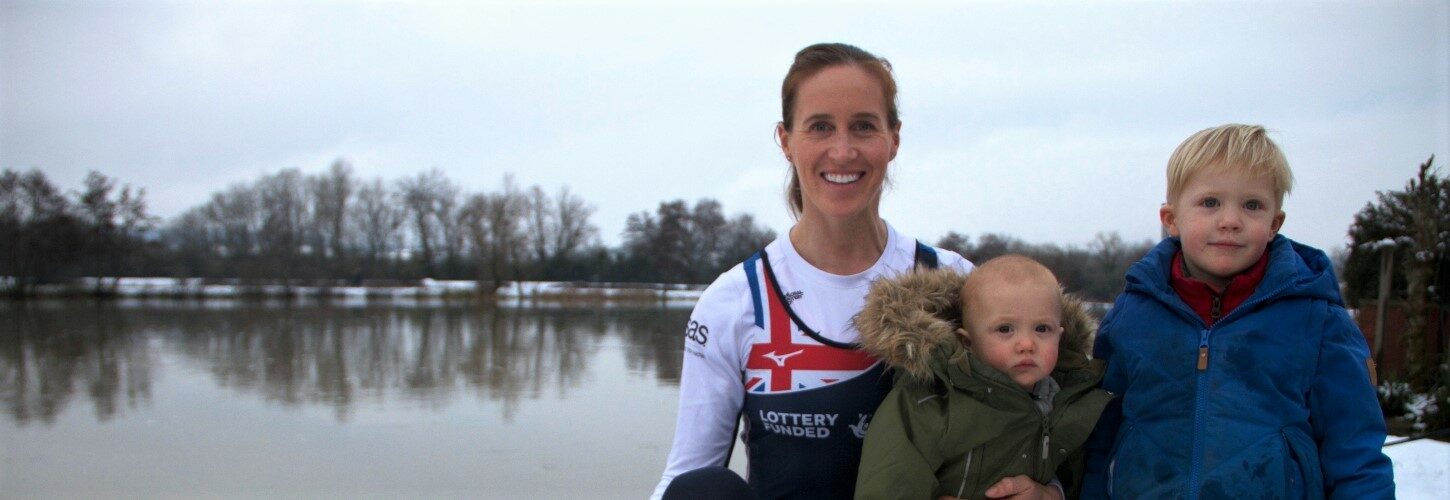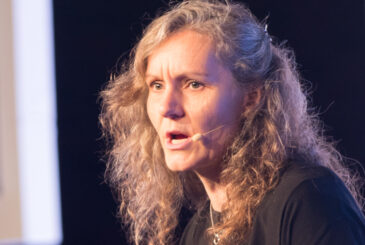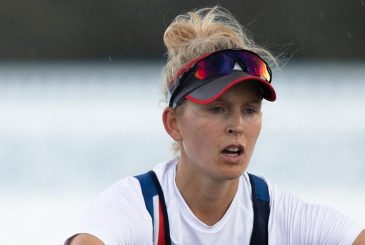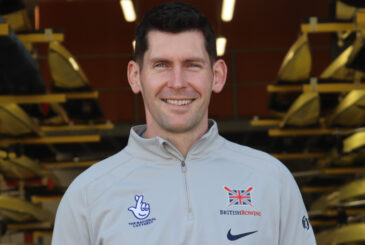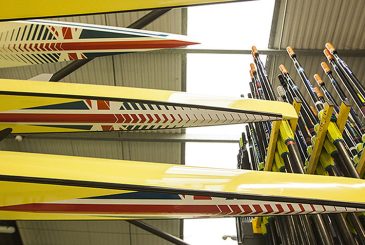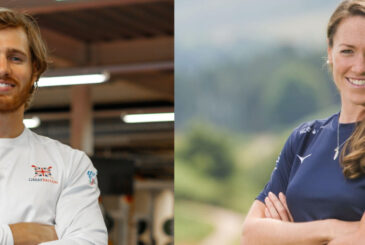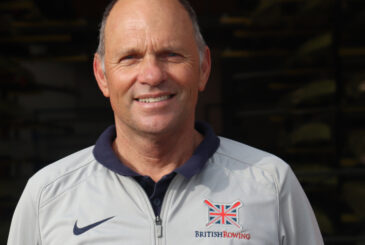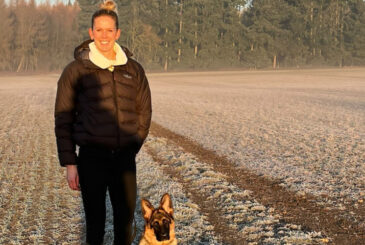After winning Olympic gold at London 2012 and Rio 2016 in the women’s pair with Heather Stanning, Helen Glover MBE is back training with the GB Rowing Team squad
A lot has changed for Helen Glover since she was last training with the GB Rowing Team at Caversham four years ago.
After success at the Rio Games, Helen married wildlife presenter Steve Backshall and the couple now have three young children, Logan, 2 ½, and one-year-old twins Bo and Kit.
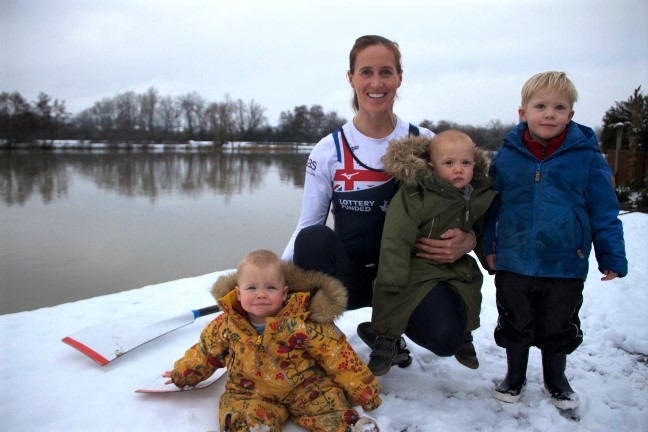
In an interview with Anne-Marie Batson, Helen shared her thoughts on her busy and happy family life, her training regime and fitness tips, plus of course her motivation for returning to elite rowing and hopes for Tokyo 2021.
Anne-Marie: What made you decide to return to training?
Helen: It was never on the cards this year, back in 2020 and the Olympics were going to be in the summer it was not a thought in my mind… I was about to have twins and was prepared to sit on the sofa and watch the Games.
Then when the first lockdown came, I was using their nap time to train, to get fit, to get back into shape and that slowly turned into spending more and more time on the rowing machine.
As a natural competitor I was comparing my times to my old times and seeing them get much closer to what I used to be able to do and then when the summer came around, I just started getting this little itch that needed to scratch, and felt ‘could it be done?’, ‘could I go back as a mum of three?’, ‘Could I go back with a year’s worth of training?’.
I still don’t know the answer to that question and that’s really exciting to me…
AM: How hard has it been to regain the fitness?
H: I guess the tough bit for me is that I never intended to come back – I had four years out of the sport. I had Logan in 2018 – I didn’t think about coming back, so I didn’t think about preparing my body for training.
Once I’d had the twins, the same again – I had never considered coming back and so I didn’t do all that physical preparation that you might do if were intending carrying on.
So, I was definitely a little bit behind in my physical preparation, but I think mentally I was in a really good place because I hadn’t had that continuous pressure of needing to focus on my sport as well as my children. I’ve had the time to enjoy them and I’ve had the time to not worry about competing and training and I think it just came at a nice time for me.
AM: Tell us about your training regime in lockdown…
H: Lockdown almost makes things a little bit more straightforward for me in that I’ve got a rowing machine at home, I’ve got a weights set up at home that I can use and so, essentially, when the babies sleep, I train.
And then in the first session of the day, Steve my husband, will always take them out for a long walk in the morning, so that routine just runs pretty much every day and it’s actually helped them get into a schedule because they know when they see me putting on my trainers that it’s that time.
It also means that when they’re awake and round the house that I’ve done my training, and that I’m back to being Mum and my absolute priority is being a parent to them – and everything else comes second to that.
AM: As parents to three gorgeous children under the age of three, how challenging has it been to manage the practicalities? Are you just someone who is just really super organised?!
H: I’d love you to know how wrong you are!
I am literally probably the most disorganised person you’ve ever met! But I actually think that helps me in this situation because nothing can be perfect, and when things don’t go to plan – which happens every single day – we just roll with the punches.
So, if I start a session and it’s supposed to be for an hour and 40 minutes and one of the twins wakes up, I get up and I give them a cuddle and that’s it, that’s my session stopped there. But I’m always internally logging those sessions and clocking what I haven’t done – and trying to make them up in other places without overwhelming myself workload wise.
AM: On social media there can be this vision of perfection – but you’re very vocal that you can still train and exercise when there’s chaos around you, as you discovered when you went on BBC News recently!
H: Yeah, I had prepped the perfect work out – I was going to do squats with a baby and maybe a bench press with a baby – but it descended into chaos… It’s just a reality.
I think coming out with this announcement as well, it’s really important to recognise the fact that things aren’t just falling into place – I’m not suddenly able to take an Olympic amount of training load without something being hard and without something being difficult and some days are more than hard. And there are days when I’m absolutely on my knees.
And I think you’re right, I don’t think you always see that on social media or in the media generally, because you see the highs, you see people standing on podiums and you don’t always see what’s gone in.
AM: Moving on to Tokyo – how does an athlete manage their mindset with all the uncertainties?
H: The most important thing to remind yourself is that safety is at the centre of every discussion and the right people are having those discussions. And when you know that, it’s much easier to focus on your training to make sure that you’re the athlete that you want to be – if, and when – the time comes.
AM: How much an achievement would it be for you to be able to compete at another Olympic Games?
H: In every Olympic Games that I’ve gone to, I’ve always thought about the result at the finish line and what that would mean – but this time around it’s much more about getting to the start line.
I think the achievement in getting to a start line in this time frame, with this family set-up – to be the first person to kind of discover a way around it and make it work within this sport – would be a huge achievement.
And definitely, if selection happens, if I get into a boat, that’s when I may start thinking more about that finish line and what the result would mean for me – but right now, honestly, what fills me with so much excitement is the potential that I could get there at all.
AM: How refreshing has it been to see some new faces on the scene in the GB Rowing Team?
H: It’s really nice and I also think – hopefully – that’s where I can come in. Even if I don’t make it, even if this isn’t achievable for me right now, I’ve hopefully helped some of those younger athletes just by coming in, by my experience. And if they get a plane without me and are faster for it, then I see that as a positive.
AM: How much has rowing changed since you took up the sport as a 21-year-old to now?
H: Rowing hasn’t changed massively, but I think what’s changed has been that no women had won a gold until London 2012, so i think when that happened there was a sudden raising of expectations. If you were on the team you can really shoot for that gold. It’s been done before and can be done again.
AM: There was such excitement on that day at London 2012 – and just joy when you and Heather won that first gold for TeamGB…
H: The amount of people who say they can remember where they were when that happened – you know the first time the national anthem played at a home Games – and the fact it was for us; it blows my mind, it totally does. I think it pinpoints a moment for a lot of people for that Games and that’s so special.
AM: What are your former coach Robin Williams’s thoughts on your decision?
H: Robin was one of the first people I spoke to when I was thinking of coming back. He was probably a bit surprised.
My journey with him had been very much him, myself and Heather – Polly had rowed in the pair for that year in 2013 as well. The amount of people involved was very small – there were five of us and to open it up to a whole new team, a whole new system, a whole new year – seemed very alien and it really seemed alien at the time.
He was encouraging, but also said to me ‘know why you’re doing it’. ‘Ask yourself why you’re doing it – and if the answer is gold or nothing, is that realistic right now? But, if the answer is to show your daughter what’s possible, if the answer is to be the first mum to do it, if the answer’s to blaze a trail and know that it could be done by people behind you then that’s a great thing.’
And, so I did go away, and I still think about that, why am I doing this – am I doing it for the right reasons? So, his advice was really, really good and really grounding.
AM: And what about your current coach?
H: James [Harris], who’s coaching me at the moment, hopefully he sees it as a positive in that he has a big group of people he’s trying get as fast as he can and so anyone who can come in and make the boat go faster has to be a positive thing.
But I’m under no illusions. He’s made it very clear that I have to be the right person, in the right position and I actually want to show him that I could be.
AM: What’s your advice to parents thinking about how they can keep fit during lockdown?
H: I think the first thing is don’t put pressure on yourself – lockdown is really hard. Being a parent is really hard. The two combined – it’s almost an impossible situation. I’ve done this as a professional athlete, as a job, and I still find it really, really difficult, so definitely don’t put yourself under pressure.
But, if you can find a part of your day when you can do some exercise then it’s usually going to make you feel so much better – it’s going to lift your mood and make you feel like a more energised parent. I’m such a strong advocate for doing exercise for that reason.
If you can forge time on your own while they nap, and if you just can’t do that – then going out for a walk that turns into a jog while you’re pushing the pram – anything like that can be so great for you.
AM: If there’s a young girl taking up rowing reading this, what advice would you give them?
H: I’d say definitely look at the British Rowing website – I bet you’ll be surprised at how close you are to a rowing club and how accessible and how inviting that rowing club is. It’s a really fun place to be, and hopefully by the summer they’ll be running some learn to row courses and that’s a great way to get involved and get started.
Have a look and find out where your club is and just get in touch and see what they’ve got there for you.
Helen Glover was talking to Anne-Marie Batson.


